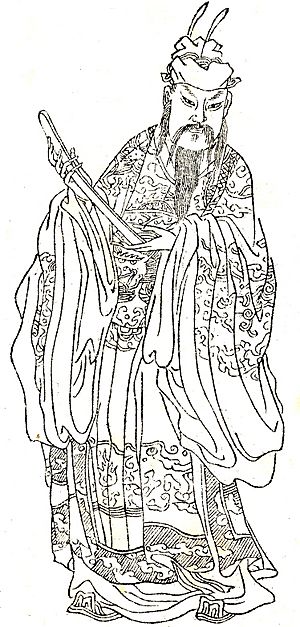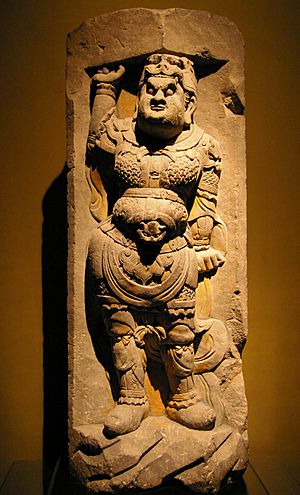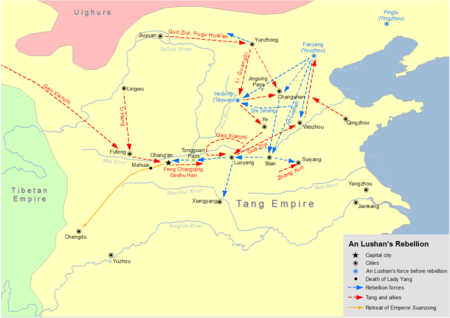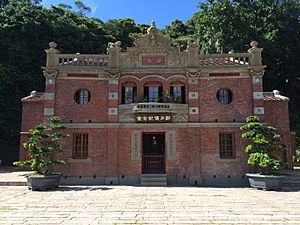Guo Ziyi facts for kids
Quick facts for kids Guo Ziyi |
|||||
|---|---|---|---|---|---|
| Duke of Dai 代國公 Prince of Fenyang 汾陽王 |
|||||

This image is from a book called "Wan xiao tang - Zhu Zhuang - Hua zhuan (晩笑堂竹荘畫傳)" which was published in the 10th year of the Republic of China (民国十年), 1921.
|
|||||
| Born | 697 | ||||
| Died | July 9, 781 (age 83-84) | ||||
| Issue | 8 sons, including Guo Ai 郭曖, father of Empress Dowager Guo | ||||
|
|||||
| Father | Guo Jingzi 郭敬之 | ||||
| Occupation | Military general, politician | ||||
Guo Ziyi (697 – July 9, 781) was a famous Chinese military general and politician. He lived during the Tang dynasty. He is best known for helping to end the major An Lushan Rebellion. He also led armies against the Uyghur Khaganate and the Tibetan Empire. Many people saw him as one of the most powerful generals of his time. After he died, some people in Chinese folk religion began to worship him as a God of Wealth and Happiness.
Contents
Guo Ziyi's Family Life
Guo Ziyi had a large family. His father was Guo Jingzi. He had a legal wife named Lady Wang. He also had other wives, Lady Zhang and Lady Li.
Guo Ziyi had eight sons:
- Guo Yao (first son)
- Guo Gan (second son)
- Guo Xi (third son)
- Guo Po (fourth son)
- Guo Wu (fifth son)
- Guo Ai (sixth son)
- Guo Shu (seventh son)
- Guo Ying (eighth son)
He also had eight daughters.
Early Life and Military Career
Guo Ziyi was born into a family of government workers in Hua Prefecture. This is in present-day Hua County in Shaanxi, China. People said he was handsome and very tall, over 1.9 meters (about 6 feet 3 inches).
Around the year 735, a famous poet named Li Bai helped Guo Ziyi. Li Bai stopped Guo Ziyi from being punished by a military court.
Unlike many in his family, Guo Ziyi became a government official through military exams. He did not take the exams for civil servants (non-military government jobs). He passed his military exams in 749. He quickly became an officer in the border areas of the Tang Empire. He rose through the ranks to become a jiedushi, which was a powerful regional military governor.
Fighting the An Lushan Rebellion
Guo Ziyi became very famous during the An Lushan Rebellion. This was a huge uprising that started in 755.
First Victories Against Rebels
When the rebellion began, Guo Ziyi was told to protect the Tong Pass. This was a very important place for defending the capital city. A large rebel army of ten thousand soldiers marched towards the pass. Guo Ziyi used a clever plan. He led the rebels into open plains where there was little to steal. This made the rebels lose hope. Meanwhile, his own Tang troops were ready to fight hard. They wanted to protect their families in the Tong Pass and the capital.
Guo Ziyi fought seven thousand rebels at the Battle of Qingbi. He won this first battle with very few losses to his own army.
By 756, the capital city, Chang'an, fell to the rebels. This happened because of bad leadership from the chancellor, Yang Guozhong. Emperor Xuanzong of Tang had to run away from the city. His own soldiers were angry at Yang Guozhong. They forced the emperor to have Yang Guozhong and his beloved wife, Yang Guifei, executed. The emperor then fled to Chengdu.
Meanwhile, Guo Ziyi faced a huge rebel army of one hundred thousand soldiers. This army was led by Shi Siming. Guo Ziyi only had ten thousand men. But he managed to delay Shi Siming's army for forty days. He tricked Shi Siming into thinking he would be ambushed. This gave time for reinforcements to arrive. Commander Li Guangbi came with ninety thousand more men. The two armies fought. The Tang forces had few losses, while the rebels lost ten thousand soldiers. Shi Siming retreated. Li Guangbi praised Guo Ziyi to the emperor. Guo Ziyi wanted to attack the rebels right away, but Emperor Xuanzong said no.
New Emperor and Shaanxi Campaign
Emperor Xuanzong's son, Li Heng, stayed in the city of Lingwu. He declared himself the new emperor on August 12, 756. He became Emperor Suzong of Tang. The new emperor immediately started planning to fight back against the rebels. From then on, Emperor Xuanzong was called the "Retired Emperor."
The rebellion made the emperor's power weaker. Many Tang generals did not always follow the new emperor's orders. Guo Ziyi was one of the few Chinese generals left in the Tang army. Emperor Suzong made Guo Ziyi the Imperial Commander. He supported Guo Ziyi's military plans, which were very successful. By 757, Guo Ziyi was fighting in the Shaanxi area. Many local people helped him against the rebels. This made Guo Ziyi's army almost twice its original size. The rebels lost many soldiers and generals. Guo Ziyi declared victory in Shaanxi.
Victory in Chang'an and Rebel Problems
Guo Ziyi then quickly moved to retake Chang'an, the capital city. He attacked with 15,000 men. The rebels only had 10,000 men. Guo Ziyi defeated them. His victories in Shaanxi and Chang'an caused problems among the rebels. Their leader, An Lushan, was killed by his own son, An Qingxu. An Qingxu gathered the remaining rebels and went to Luoyang. When Emperor Suzong returned to Chang'an, he was very happy. He told Guo Ziyi, "This country may be mine, but you rebuilt it."
In 758, Guo Ziyi and other generals were ordered to defeat the last rebels. However, Emperor Suzong was worried that his generals were becoming too powerful. So, he put his eunuchs (court officials) in charge of the campaign. This caused problems. But Guo Ziyi managed to convince other generals to surround the rebel city. This made the rebels run out of supplies. When it was time to attack the city, there was no single commander. All the generals were of equal rank, so the attack failed. Meanwhile, more rebel soldiers arrived. The Tang forces missed their chance to finish off the rebels.
A big battle happened in 759 in bad weather. Again, there was no central command for the Tang army. The Tang forces won, but both sides lost many soldiers. The emperor was not happy with the result. The generals started blaming each other. Many blamed Guo Ziyi. However, ordinary people still trusted and followed Guo Ziyi the most. Emperor Suzong was worried about Guo Ziyi's popularity. He used this as an excuse to reduce Guo Ziyi's power. He demoted Guo Ziyi but rewarded the other generals.
Under Emperor Suzong's Rule
Even though the An Lushan Rebellion ended in 763, the Tang dynasty faced a new threat. The Tibetan Empire had become very strong. During the An Lushan Rebellion, Tibet broke its peace treaty with the Tang and supported the rebels. The Tang army was weak after the rebellion. Its border defenses could not stop Tibetan attacks. Many generals were not Chinese and did not care much about defending the Tang Empire.
Because of this, Emperor Suzong promoted Guo Ziyi again. But he was only a military figurehead, meaning he had no real power. The emperor hoped that just the threat of sending Guo Ziyi would keep the Tibetans away. In 762, a general named Wang Yuanzhi killed another general. Wang claimed that the troops were still so loyal to Guo Ziyi that they demanded he be put back in charge. Emperor Suzong had to give Guo Ziyi his old position back. When Guo Ziyi arrived, he did not thank Wang. Instead, he criticized Wang for killing his commander. He said such actions hurt the army's order and could encourage the Tibetans to attack. General Wang admitted his mistake. After this, Guo Ziyi took command, and the Tibetans stopped their attacks.
Under Emperor Daizong and Tibetan Invasions
Soon after, Emperor Suzong died. His son, Emperor Daizong of Tang, became the new emperor. The new emperor was worried about Guo Ziyi's fame. He called Guo Ziyi back to Chang'an. Guo Ziyi warned the emperor about the danger from the Tibetans, but the emperor mostly ignored him.
Tibetan Invasion of 763
In 763, a huge army of 100,000 Tibetans invaded the Tang Empire. Emperor Daizong fled Chang'an on November 16 because it was clear the city would be captured. The Tibetans even crowned their own emperor in Chang'an. But they retreated a month later. They feared a large Tang army was coming.
In reality, Guo Ziyi had only sent a few cavalry scouts. These scouts lit fires in places where the enemies could see them. Then they retreated. Guo Ziyi also sent secret messages to Chang'an. He told citizens to bang gongs and make fires. The Tibetans were confused by these actions. They panicked when a rumor spread that Guo Ziyi was moving against them with a huge force. The Tibetans retreated from their positions. The invasion ended without a big battle. Many Chinese historians say this was a perfect example of Sun Tzu's idea of winning without fighting. Some sources say Guo Ziyi sent only 13 scouts, while a Tibetan text says there were 200. Either way, the Tibetan army left. When Guo Ziyi arrived at Chang'an with his "large" force, Emperor Daizong told him, "If I had used you sooner, so many deaths would not have happened!"
Tibetan Threat of 765 and the Uyghur Alliance
The Tibetans attacked again in 765. A general named Pugu Huai'en sent false messages to the Tibetan emperor, Trisong Detsen. He told him that Guo Ziyi had died. The Tibetan emperor wanted revenge for earlier defeats. He sent a large force to attack Tang China again. Some Uyghur leaders also believed Guo was dead. They joined forces with the Tibetans. The Tibetan force was over 30,000 soldiers, including a few thousand Uyghurs. However, Pugu died on September 27, and his army joined the Tang side.
When Emperor Daizong heard about the Tibetan attack, he sent Guo Ziyi to defend the Tang. Guo Ziyi had only a few thousand men. When Guo was close to the enemy, he decided to go alone to see the Uyghur leaders. His officers and his son, Guo Xi, were very worried. They tried to stop him. Guo Ziyi laughed and convinced his officers to let him go. But his son would not let go of his horse's reins. Guo Ziyi got angry and whipped his son's hand. He told his son that this was a life-or-death situation for the empire. He said their small force would die if they fought the Tibetans alone. If his plan worked, the empire would be safe. If it failed, only his own life would be lost.
When Guo Ziyi arrived at the Uyghur camp, he did not say who he was. He pretended to be a messenger. He said he was sent to tell them that Guo Ziyi was coming to see them. The Uyghur leaders were surprised and panicked. Many of them had fought against Guo Ziyi before. They decided they had to meet him. Guo Ziyi then laughed and asked them why they would want to face him again after their past defeats. The Uyghur leaders said they had been told he was dead. They said if they met him and saw he was alive, they would retreat. Guo Ziyi insisted that he did not want them to retreat. Instead, he wanted them to join him against the Tibetans. The Uyghur leaders said they had been tricked by the Tibetans about Guo's death. They agreed to break their alliance with the Tibetans. They even said their wise people had predicted a great man would lead them to victory. They now believed this man must be Guo Ziyi. They agreed to join forces with the Tang.
Battle of Xiyuan
Guo Ziyi went back to his camp. He ordered a thousand horsemen to quickly attack the Tibetan camp at Xiyuan. When the Tibetans realized the Uyghurs had broken their alliance, they tried to leave. But Guo's horsemen arrived and scattered them. At the same time, Guo's Uyghur allies arrived and stopped the Tibetans from retreating. Over 10,000 Tibetans were killed in the battle. Another 10,000 were taken prisoner. Guo Ziyi continued to chase the Tibetans. He freed over 4,000 Tang people they had captured.
When the Tibetan emperor heard his army was defeated, he quickly sent a message to Emperor Daizong. He asked for peace. He claimed his army had just been on a hunting trip and did not mean to attack the Tang Empire. Emperor Daizong did not believe him, but he agreed to the peace. After this, Tibet was never again a major threat to China.
Later Life and Honors
Guo Ziyi was later given the title "Prince of Fenyang." So, people often called him "Guo Fenyang." He lived to be 85 years old. After he died, he was given the special name Zhongwu, which means "Loyal and Martial."
There is a famous story from 767. Guo Ziyi's son had an argument with his wife, who was a Tang princess. During the fight, Guo's son compared their fathers, Emperor Daizong and Guo Ziyi. Guo's son supposedly said, "What's so great about being an emperor? My father could become emperor anytime if he wanted to." Guo Ziyi was so angry about this disloyal idea. He locked up his son and waited for Emperor Daizong to decide his punishment. The princess felt bad and asked Guo to forgive his son. But Guo refused. When Emperor Daizong arrived, he pardoned the son. He told Guo, "When children fight, it's better for old men to pretend to be deaf."
Popular stories say that the Jade Emperor (a god in Chinese folklore) was very happy with Guo Ziyi. He was pleased with how Guo defended the country and brought happiness to people. The Jade Emperor sent a heavenly official to ask Guo what he wanted most. Guo replied that he had fought for so long and seen so much bloodshed. All he wanted was peace and happiness. As a reward, the Jade Emperor guided Guo to heaven. He gave him the job of "God of Prosperity and Happiness."
Guo Ziyi's Lasting Impact
Many historians say that Guo Ziyi was the main reason the An Lushan Rebellion ended. They believe he almost single-handedly saved the Tang dynasty. His actions also had a big effect on East Asia. He improved the Tang's relationships with its Uyghur allies. These allies later helped the Tang fight against the Tibetan Empire. After Guo Ziyi's victories over the Tibetans, they never regained their military strength. They lost much of their power in Asia.
Around 757, Guo Ziyi saved the famous poet Li Bai from being executed for treason. Guo Ziyi offered to give up his own official rank to save Li Bai's life. In the end, Emperor Suzong changed Li Bai's punishment to exile. Later, he pardoned Li Bai, and Guo Ziyi was allowed to keep his rank.
Future members of Guo Ziyi's family also became famous generals. These included Guo Puyo, a general used by Genghis Khan. Another was Guo Kan, one of the best generals of the Mongol Empire. He played a key role in the Mongol Siege of Baghdad (1258).
In Stories and Culture
- He was played by Leung Ka-Yan in TVB's Taming of the Princess (1997).
- Lee Kwok-lun played him in The Legend of Lady Yang (2000).
- Wang Zhi Hua played him in Love With Princess (2006).
 | Emma Amos |
 | Edward Mitchell Bannister |
 | Larry D. Alexander |
 | Ernie Barnes |






